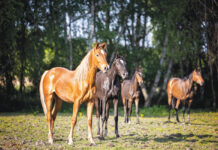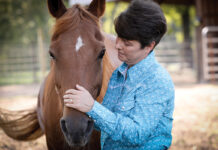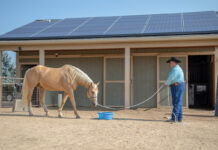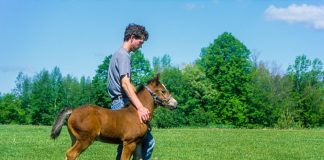
“They look wonderful now,” she says. “But you should have seen them last night.”
Last month, Tluczek and her husband trailered Sammy, a 3-year-old Paint and Ringo, an 11-year-old Quarter Horse from a boarding barn in near Fort Bragg, N.C., to the couple’s home in an equestrian community in Parrish, Fla.
Once everyone settled in, Tluczek got lots of help from neighbors who recommended a veterinarian that specialized in equine care, a skilled and reliable farrier and a list of the best sources for feed, hay and bedding. During the first few weeks, the horses did pretty well.
“On the advice of our farrier and others, we’re reducing the richness of their food because they just don’t need the calories and we’re giving them psyllium to help prevent sand colic,” she says.
The pair seemed to adapt to their new surroundings too. But then, the Florida summer kicked in with its above 90-degree temperatures and daily thunderstorms.
“The climate has been a challenge, but they’re handling it,” Tluczek says. “But the storms are something else – Sammy came through the episode just fine, but Ringo was a the back of his stall snorting with his ears pinned .”
From adjusting feed to acknowledging climate changes, helping horses adapt to a new home across state lines or even just on the other side of town is crucial to the animals’ welfare, says equine behaviorist Jennifer Williams Ph.D., founder of the Bluebonnet Equine Humane Society. But not all horses react to an environmental change in the same way.
“Jut like people, some horses can go almost anywhere, fit in and be fine,” Williams says. “Some take longer to adjust, settle in and get comfortable.”
In fact, horses that are accustomed to being on the road to shows or trail riding venues are likely to do better when they are relocated. Those used to staying at home are more likely to have trouble acclimating.
“If you have a young horse or horses who haven’t left the farm before, moving to a new place can be harder on them,” Williams says. “It can also be tough for horses who have moved to new owners or have moved without their friends.”
In any case, there are things owners can do before during and after a move that can help their horses adapt. Here’s what Williams recommends:
- Practice trailer loading
“You don’t want to start off the move wit a horse who had to get a trailer lesson and is stressed and upset from the very beginning.” - Take along your horse’s usual feed, hay and water
“This way you can transition to the new grain, hay and water slowly,” Williams recommends. - Buddy up
If possible, trailer the horse to a new horse with another horse. When bringing a new horse home, pair him in the trailer with a seasoned traveler.”They may even bond in the trailer,” Williams says. “A steady companion can give the new horse confidence.” - Don’t rush
Don’t be in a hurry to turn the horse out with new pasture mates. Give him time to settle in.”Make sure he can see others, though,” Williams recommends. “Put the horse in a stall next to new barn mates, or in a paddock or pen near their pasture; after a few days you can start to integrate the relocated horse into the herd.”Also, don’t be in a hurry to put the horse to work for the first week after the move.”Let the horse adjust to his new place, especially if he does not know you,” Williams says. - Pay attention
Though each horses adjusts to a move differently, relocated animals should still eat and drink regularly, and not show signs of excessive stress or nervousness.”If the horse isn’t eating or drinking, if he starts losing weight or develops stereotypy (vices, or unwanted behavior such as such as cribbing), schedule a visit from the veterinarian,” says Williams.
According to Williams, most horses will adjust to their new homes in a week or so. For their owners the learning curve may be higher.
“I’m still getting used to their being here,” says Tluczek. “I’m learning every day.”





